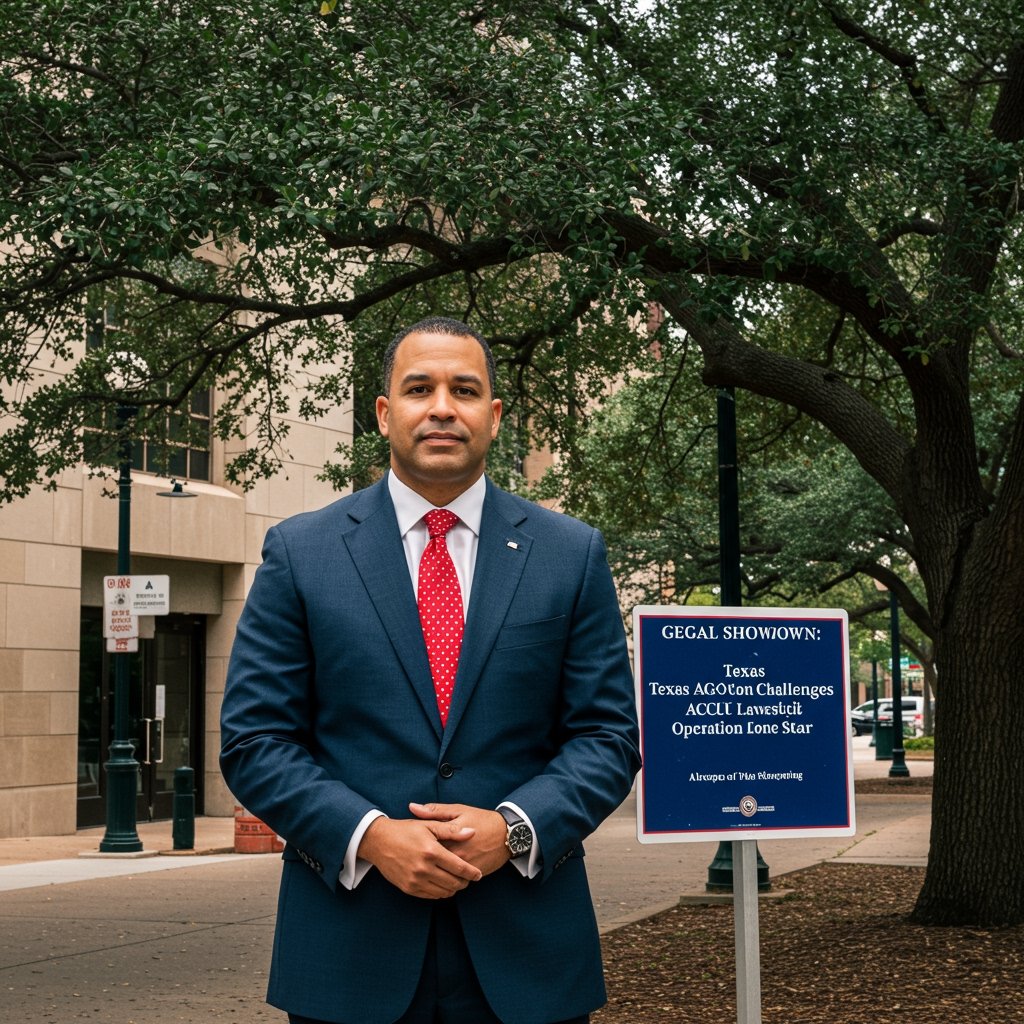Texas Attorney General Responds to Legal Challenge Against Operation Lone Star Expansion
Texas Attorney General Ken Paxton issued a forceful statement today addressing the federal lawsuit filed against the state on May 20th. The suit, brought forth by the American Civil Liberties Union (ACLU) and a coalition of other advocacy groups, specifically targets the expanded scope of Operation Lone Star, the state’s multi-billion dollar border security initiative. At the heart of the legal challenge are provisions that grant state law enforcement significantly broader powers in matters traditionally falling under federal immigration jurisdiction.
Attorney General Paxton wasted no time in characterizing the lawsuit. He publicly described the legal action as “politically motivated,” a common refrain from his office when faced with challenges to the state’s border policies. He further asserted that the State of Texas possesses the “sovereign right” to defend its border, particularly in response to what state officials frequently term “federal inaction” on immigration enforcement.
Paxton’s office confirmed that preparations are underway to mount a “robust legal defense” against the filing. The lawsuit seeks significant injunctive relief, aiming to block or severely curtail key aspects of the state’s ongoing border security operations under Operation Lone Star. The central claim put forth by the ACLU and co-filers is that Texas’s actions fundamentally overstep federal authority concerning immigration law, potentially violating the Supremacy Clause of the U.S. Constitution, which establishes that federal laws and treaties are the supreme law of the land.
Background: Operation Lone Star and Expanded State Authority
Operation Lone Star was launched in March 2021 by Texas Governor Greg Abbott. Initially conceived as a joint effort between the Texas Department of Public Safety (DPS) and the Texas Military Department (primarily the Texas National Guard under state command), the operation aimed to deter illegal immigration, combat human trafficking, and disrupt cartel activities along the state’s vast border with Mexico. The operation has involved deploying thousands of state personnel, constructing physical barriers, and utilizing various state-level law enforcement tactics.
Over time, the scope of Operation Lone Star has expanded significantly, both in terms of personnel and the legal strategies employed. This expansion includes the use of state trespass laws to arrest migrants, the establishment of state-run immigration processing facilities, and the controversial bussing of migrants to cities across the country. The legal provisions challenged by the ACLU lawsuit appear to relate to recent legislative actions or state-level directives that further empower state law enforcement officials—such as DPS troopers and local police officers acting under state command or coordination—to engage in activities traditionally performed by federal agencies like U.S. Customs and Border Protection (CBP) and U.S. Immigration and Customs Enforcement (ICE).
This includes potential involvement in identifying, apprehending, and processing individuals based on their immigration status, activities which the federal government maintains fall exclusively under its purview. The state of Texas, however, argues that it is exercising inherent state powers to protect its territory and citizens from what it describes as an invasion or a crisis exacerbated by insufficient federal action.
The ACLU’s Legal Challenge: Asserting Federal Supremacy
The lawsuit filed by the ACLU and its partners on May 20th centers on the principle of federal preemption. Under the U.S. Constitution, particularly the Supremacy Clause, the power to regulate immigration and manage the nation’s borders rests primarily with the federal government. While states can pass laws that indirectly affect immigrants or run parallel to federal law (like enforcing criminal statutes that might involve individuals regardless of immigration status), they generally cannot create their own immigration systems or enforce federal immigration laws directly unless specifically authorized by Congress.
Historically, the Supreme Court has affirmed this federal dominance in immigration matters. A notable case, Arizona v. United States (2012), struck down several provisions of an Arizona state law that attempted to significantly enhance state immigration enforcement powers, ruling that they were preempted by federal law. The ACLU’s lawsuit against Operation Lone Star’s expanded authority draws heavily on this legal precedent, arguing that Texas is attempting to implement a state-level immigration enforcement regime that conflicts with and is preempted by the comprehensive federal framework.
The plaintiffs in the lawsuit contend that the challenged provisions of Operation Lone Star not only violate the U.S. Constitution by encroaching on federal authority but also risk leading to civil rights violations. Concerns have been raised by civil liberties groups regarding racial profiling, unlawful arrests, and denial of due process for individuals apprehended under the expanded state powers. The lawsuit seeks a federal court order to halt these specific state actions, arguing they cause immediate and irreparable harm.
Attorney General Paxton’s Defense: State Sovereignty and ‘Federal Inaction’
Attorney General Ken Paxton’s declaration that the lawsuit is “politically motivated” suggests a defense strategy that will likely highlight the perceived failure of the federal government to adequately secure the border. This narrative is central to Texas’s justification for Operation Lone Star – the argument that the state is compelled to act due to a void left by federal enforcement.
The claim of Texas’s “sovereign right to defend its border” invokes the concept of state sovereignty and potentially arguments related to the state’s inherent power to protect its territory and citizens. While states possess broad police powers, the extent to which these powers can be exercised in the realm of immigration, where federal authority is paramount, is the core legal question at hand. Paxton’s office preparing a “robust legal defense” indicates they will likely argue that the state’s actions are either not preempted by federal law, are a necessary exercise of state police power in an emergency situation, or are somehow consistent with the federal framework.
This defense will likely involve distinguishing Operation Lone Star’s actions from the provisions struck down in Arizona v. United States or arguing that the current border situation constitutes an exceptional circumstance justifying more assertive state intervention. Texas has previously attempted to argue that the state is facing an “invasion,” a term found in the U.S. Constitution’s guarantee clause (Article IV, Section 4), which obligates the federal government to protect states against invasion. While courts have historically interpreted this clause narrowly and in the context of hostile foreign states, Texas has sought to apply it to the current situation at the border as a justification for state self-defense actions.
Legal Implications and What Comes Next
The lawsuit filed on May 20th represents a significant legal challenge to the core of Texas’s Operation Lone Star strategy. Should the ACLU and its co-plaintiffs succeed, a federal court could issue an injunction preventing state law enforcement from exercising the expanded immigration authorities targeted by the suit. This would likely necessitate a significant re-evaluation and scaling back of certain Operation Lone Star tactics.
Conversely, if the state successfully defends its position, it could set a precedent that might encourage other states to adopt similar expansive roles in immigration enforcement. This case is poised to become another key legal battle in the ongoing tension between state and federal authority over immigration, a recurring theme in American legal and political history.
The initial stages of the lawsuit will involve legal briefings, potentially motions for preliminary injunctions, and responses from the state. The process could take months or even years to resolve, potentially reaching the U.S. Supreme Court given the constitutional issues at stake. Attorney General Paxton’s commitment to a “robust legal defense” signals the state’s intention to vigorously fight the lawsuit, ensuring that this legal confrontation over the future of border security and state versus federal power will be closely watched nationwide.






